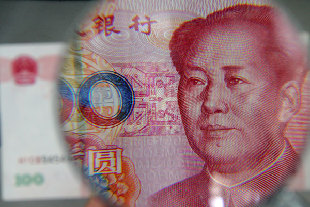
Central bank chief Zhou Xiaochuan said on Monday that the country's goal to achieve the yuan's capital account convertibility doesn't necessarily mean 100 percent convertibility or a free-floating currency. [Photo/China Daily]
 |
|
Central bank chief Zhou Xiaochuan said on Monday that the country's goal to achieve the yuan's capital account convertibility doesn't necessarily mean 100 percent convertibility or a free-floating currency. [Photo/China Daily] |
Central bank chief Zhou Xiaochuan said on Monday that the country's goal to achieve the yuan's capital account convertibility doesn't necessarily mean 100 percent convertibility or a free-floating currency.
"We shouldn't interpret capital account convertibility as a free currency, with cross-border asset transfers without control, zero financial supervision, and the internationalization of the yuan," said Zhou, governor of the People's Bank of China.
International institutions such as the International Monetary Fund didn't set up clear and unified standards to measure the openness of capital accounts, and 100 percent convertibility barely exists, Zhou said at a forum in Sanya, Hainan province.
He said China's target to open up convertibility doesn't rule out the necessity of maintaining certain existing filing procedures when entities conduct cross-border financial transactions, financial supervision, and certain capital controls to prevent money laundering and tax avoidance.
Zhou's comments followed the two-day Central Economic Work Conference, which ended on Sunday. During the conference, leaders vowed to create a general plan, road map and timetable for further reform measures, without announcing specific moves in 2013.
Liu Guangxi, director of the financial office of Yunnan provincial government, said on Monday that he believes China has already realized 70 to 80 percent of its capital account convertibility.
Earlier this year, China's top securities regulator, Guo Shuqing, a candidate to be the next central bank governor, said the full convertibility of China's currency is just around the corner, and the economy's capital account is already far more convertible than outside institutions give it credit for.
He said 16 items in China's capital account are convertible now, 17 are basically convertible and seven are partially convertible. Further, he said, "There is no item that is inconvertible."
Guo added that countries in different phases of development must make their own analyses in accordance with their own methods of opening up and their own situations.
Zhou also said the country doesn't welcome short-term speculative capital inflows, and capital controls are still necessary in some circumstances to fend off financial risks brought by "hot money" inflows in emerging economies.
Dealing with capital inflows into China would be a larger problem for the country than money rushing out.
"China fortunately has accumulated a massive amount of foreign reserves to allow it to weather some of this international capital-flows storm better than other countries would have be able to," said Austan Goolsbee, economic professor at the University of Chicago, and a former adviser to US President Barack Obama.
China has announced a series of measures to liberalize its capital accounts in recent months.
Earlier this month, the State Administration of Foreign Exchange said that it will launch a pilot system on Jan 14 to better monitor cross-border capital flow.
In November, the administration said it will clear the way for foreign investor capital to flow in and out of the country more easily by waiving and simplifying regulations.
And a pilot program was launched in Shanghai to allow yuan cross-border lending by onshore multinational corporations to offshore parent companies or related companies within the same group, viewed as another significant step toward liberalizing capital accounts.
"For some items under the capital account, once the government has made up its mind and implemented policies, they would be open for convertibility all together very quickly," Zhou said. But coordination between some foreign-exchange policies and other regulatory rules - for example, the imposition of an export tax - will take some time, he added.
"As underscored by the lessons from emerging market financial crises in the last 20 years, sequencing of reforms is crucial, and the right sequence is to introduce substantial exchange rate flexibility before opening up the capital account to financial flows in a major way," said Louis Kuijs, chief China economist at the Royal Bank of Scotland Group and a former World Bank economist.
主站蜘蛛池模板: 男女爽爽无遮挡午夜动态图| 鲁啊鲁阿鲁在线视频播放| 韩国三级hd中文字幕| 少妇高潮无套内谢| 久久五月精品中文字幕| 狠狠做深爱婷婷久久综合一区| 国产va精品免费观看| 91福利免费视频| 日本中文在线视频| 亚洲精品aaa| 精品久久久久香蕉网| 国产jizz在线观看| 香蕉久久夜色精品国产| 国产真实乱子伦精品视频| 91欧美在线视频| 大学生被内谢粉嫩无套| 一本大道香蕉高清视频视频| 成年在线网站免费观看无广告| 久久久国产99久久国产久| 日韩电影免费在线观看中文字幕| 亚洲伊人色欲综合网| 欧美精品在线免费观看| 亚洲高清无在码在线电影不卡| 粗大的内捧猛烈进出小视频| 午夜男女爽爽影院网站| 老熟妇仑乱一区二区视頻| 国产精品久久久久久久久99热| 一级性生活视频| 把极品白丝班长啪到腿软| 久久亚洲精品国产精品黑人| 日韩欧美一区二区三区免费看| 亚洲AV无码乱码麻豆精品国产 | 亚欧洲精品bb| 欧洲美女与动性zozozo| 伊人五月天综合| 精品人人妻人人澡人人爽牛牛| 又黄又爽又色的视频| 黄色网址免费在线| 国产成人精选免费视频| 欧美黄色一级在线| 国产男女视频在线观看|